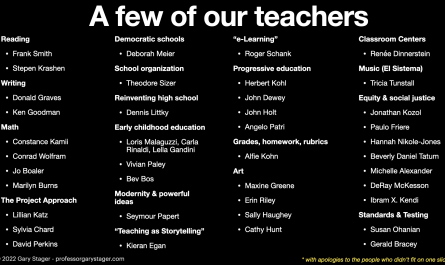David Warlick is the latest person to go all “digital immigrant” and proclaim that we should all take a good hard look at the hugely popular YouTube video, “A Vision of Students Today.”
Fantastic. A college class with far too many students in it (200) attempts to revolutionize the educational system by whining in a five minute web video.
I’m sorry, but count me unimpressed!
Perhaps a student should hold up a sign saying, “My professor is wasting my time and money by making me participate in a piece of exploitative propaganda in which I get to insult either my generation or the one before me just to get on YouTube.”
How did bashing our own profession become such a popular sport? What possible value could demeaning educators have in a professional development setting? Are we desperate for moving pictures or are they merely a substitute for actual ideas?
Is showing these types of videos the conference speaker equivalent of the teacher running the filmstrip to eat up class time?
One valuable lesson you should learn at university is that the world is full of people smarter than you and wondrous things to learn. This video and the mindless kudos afforded it make just the opposite point. Hey kids, you have cellphones! You’ve played Halo and excerpted someone else’s blog which in summarized someone else’s blog which excerpted an article on a magazine web site. Therefore, you are master of the universe and every educational institution should abandon scholarship, discipline and any text longer than a screen.
I’ve wanted to tell the Web 2.0pians the following for some time:
- Observation is not insight.
- Factoids are not knowledge
- Talk (in this case, mime) is cheap.
A concerned competent educator might ask, “What should Ido to make learning relevant without making it dopey or trivial?” This video offers no such guidance.
The excitement and praise afforded “A Vision of Students Today” is a clear example of what Dr. Seymour Papert called, “verbal inflation.” Apparently we should all be astonished that college students used Google Docs and then conflate such a trivial mechanical act with educational innovation.
Originally published Monday, November 05, 2007 in The Pulse: Education’s Place for Debate.
Veteran educator Gary Stager, Ph.D. is the author of Twenty Things to Do with a Computer – Forward 50, co-author of Invent To Learn — Making, Tinkering, and Engineering in the Classroom, publisher at Constructing Modern Knowledge Press, and the founder of the Constructing Modern Knowledge summer institute. He led professional development in the world’s first 1:1 laptop schools thirty years ago and designed one of the oldest online graduate school programs. Gary is also the curator of The Seymour Papert archives at DailyPapert.com. Learn more about Gary here.


Hi Gary, What happened to our discussion about this? (especially my irrefutable dismantling of your position (Just kidding 😉 )) Were the comments lost in the migration to the new platform?
Gary,
We must be coming together in our thinking if you have to reach back to something I posted in 2007 to pin on me. I agree with your three bullet points. But I think you would agree that insight and knowledge come from lots of types of experiences — even the tinkering that happens in conversations…
I tip to you, my glass half full 🙂
— dave —
Hi Michael,
Sorry for the loss of comments. We should discuss it someday.
I migrated and republished this yesterday in response to someone tweeting about the derivative. A Vision of 21st Century Teachers, http://www.youtube.com/watch?v=B4g5M06YyVw
You do indeed engage in some of the most serious work in the field, even if I don’t like that video.
Bashing is Good. If I were an undergraduate paying for a brick-and-mortar education, I would want my professor’s students to be hard-hitting in their “bashing” of his teaching skills, and his peers to be hard-hitting in their “bashing” of his understanding of the curriculum. I would want my diploma to carry the weight of a reputation for good bashing and transfer its connoted value to me.
Sloppy Bashing is bad. False dichotomies are bad: university educational quality is about curriculum AND pedagogy (AND good bashing AND institutional design). Over-simplifications are bad: undergraduate pedagogy needs to work on the prefrontal cortices of 20-year-olds (netizens or not), while seminars may still work for doctoral students (though my doctoral friends say that system’s broken too, for different reasons).
I see Michael doing pedagogy-bashing, not curriculum-bashing and not institution-bashing, but maybe he needs to be clearer about that. How much professors know is irrelevant to that critique. I think there’s plenty of constructive bashing to go around all three topics, but we should stick to one at a time.